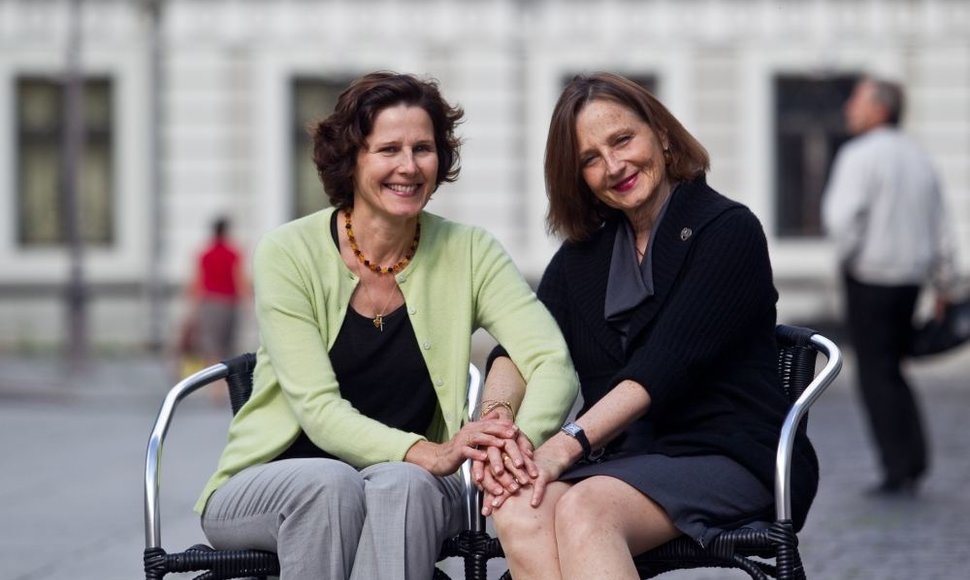It is how they were raised by Vaičiulaitis' three daughters, Joana, Aldona, and Danutė, all of whom were born in emigration. The three sisters are surprised that new-wave emigrants of today neglect their roots.
Two daughters of Antanas Vaičiulaitis, a known Lithuanian author, translator, and diplomat, recently visited the land of their father. US-born Aldona Vaičiulaitytė-DeBold and Danutė Vaičiulaitytė-Nourse stayed here for only a week but saw quite a lot of the country – they took part in events commemorating the 20th anniversary of their father's death in Vilnius, Kaunas, and Vilkavišis, where he was born.
“You simply must see our house – it hasn't perished across wars and occupation and today it is protected as cultural heritage. You know thanks to whom? Women who stayed there – our father's sisters. They said: We'll stay at home, since what would happen, if Antanas returned and didn't find his home? Aunt Elenutė died in the same room she was born,” elder Danutė Vaičiulaitytė-Nourse, 62, says in perfect Lithuanian.
A hundred percent Lithuanian
Danutė saw Lithuania for the first time when she was thirty. In 1979, father took her with himself to the country he had not seen since 1940, when he left to work in Lithuania's embassy to Vatican.
“Our emotional connection to Lithuania has always been very strong – dad implanted love for this land since early age. At home, we would speak only Lithuanian – after all, blood flowing in our veins was 100 percent Lithuanian,” says Vaičiulaitytė-Nourse, recalling an incident that landed her in jail at 21.
“In protest against injustice in Lithuania, I locked myself to the Soviet embassy in Washington D.C. I was arrested. I called dad and said – I'm in jail. He replies: “Bravo!” That's the spirit we were raised on,” grins Vaičiulaitytė-Nourse.
Letters under English name
Zita Rimkuvienė, cousin of the Vaičiulaitytės sisters, lives in Vilnius and runs Antanas Vaičiulaitis' charity and relief fund. She, too, remembers her uncle's first return to Lithuania.
“What particularly stuck in my memory was a moment when my uncle, who had spent forty years in emigration, and his wife came to their home village. We greeted the guests outside and started talking, and he goes: 'All right, come on, everyone inside.' He invited us as if to his own house – like he were a master. That means that in his heart, he had never left home,” Rimkuvienė says.
She can also recall uncle's letters from across the ocean, signed with “some English name.”
“He was a very warm, homely, and attentive family man,” the niece says of her uncle.
Alive in his writing
“When I was born, dad was already 51. But he knew how to deal with kids. Firstly, he took us, and later his grandkids, to museums, zoos, to the nature. He would very patiently show and explain what a river was, a tree, he'd carefully inspect every leaf. He was calm and kind. He couldn't say a single mean word, not to mention punishing us. The worst thing to come out of his mouth would be “Well I say!” That's how we knew daddy was mad,” says Aldona Vaičiulaitytė-DeBold, 55.
The two sisters say the biggest gift from their father, who passed away in 1992, was his writing. “Through his works, we can be together even now, feel his presence. It makes life easier for us and we hope that for others too. As father used to say: 'If at least one word of mine reaches other epochs, I will be happy,” Vaičiulaitytė-Nourse shares.
Currently, efforts are made to perpetuate the memory of Antanas Vaičiulaitis and support Lithuanian writing. The Vaičiulaitytės sisters carry on with the tradition of Vaičiulaitis' literary prize. The prize was established in 1994 by Vaičiulaitis' wife Joana Ambramikaitė-Vaičiulaitienė. The ninth literary prize for best short story, that appeared in the Metai magazine published by the Lithuanian Writers Union, was awarded this year to Laura Sintija Černiauskaitė.
Respect for one's roots
The Vaičiulaitytės try to make their father's wishes come true. “Especially his last will to be buried next to his parents in Vilkavišis cemetery. We did it. Mother rests there too,” says Vaičiulaitytė-Nourse.
Vaičiulaitis and his wife brought up three daughters and had seven grandchildren. All of them speak at least some Lithuanian, everyone has been to this country and have been raised to respect their roots.
“If you have no respect for your origins, that means you have no respect for yourself. I've always told my children: get to know tradition and the place you came from, then you'll know yourself,” claims Vaičiulaitytė-Nourse. “Granted, father's connection to Lithuania was different from ours and so is our children's. They haven't suffered the national drama, so they feel more like tourists here. But we believe they will carry on with our projects and the Vaičiulaitis family traditions. The world will be even more modern then, but human values will remain, because they are fundamental.”
Danutė, who works as an administrator at Seton Hall University, admits that each family trip to Lithuania reminds more of a marathon than vacation. Above all, it is a tribute to the memory of Vaičiulaitis and admirers of his oeuvre.
“Sooner or later, every man realizes he must seek goals that are bigger than himself and his personal wellbeing. It will be some time before Lithuania becomes what you want it to be, but the most important things – democracy and the Constitution – are already in place. Nations are of the people, not governments. But do you really need that many Maximas (supermarkets)?” Vaičiulaitytė-Nourse asks.
Antanas Vaičiulaitis
Vaičiulaitis was born on 23 June 1906, in Didieji Šelviai, Vilkaviškis, and died on 22 July 1992 in Washington, D.C. He was a Lithuanian diplomat, writer, translator.
Vaičiulaitis belongs to the generation of authors who grew up in independent Lithuania, during the period that is celebrated as the golden age for the Lithuanian culture.
He went to Vilkaviškis Žiburys Gymnasium that has among its graduates other distinguished figures like Salomėja Nėris, Juozas Tysliava, Kazys Bradūnas.
He went to the Lithuanian University (that was later renamed Vytautas Magnus University) in Kaunas to study Lithuanian and French languages, literature, pedagogy, psychology. He later worked as a teacher in Kaunas Jesuit Gymnasium. Between 1935 and 1938, Vaičiulaitis continued his studies in France, Grenoble and Sorbonne.
After returning to Lithuania, Vaičiulaitis worked for ELTA news agency, lectured in Vytautas Magnus University and accepted an appointment to the embassy in Vatican in 1940. During World War Two, he was invited to give lectures in the US, worked for Voice of America radio, edited Lithuanian cultural publications.
Vaičiulaitis is considered one of the outstanding Christian humanists of Lithuanian literature. He is sometimes compared to French and Italian authors like André Maurois, François Mauriac, Giovanni Papini. His best-known work is a novel “Valentina.”
None of Vaičiulaitis' descendants followed in his literary footsteps – they work as engineers, teachers, businesspeople.
In order to preserve Vaičiulaitis' home, a fund was established in 2008. For more information on how to contribute to the project, contact sitarim@gmail.com, vaiciulaitis@lietuvis.net.













